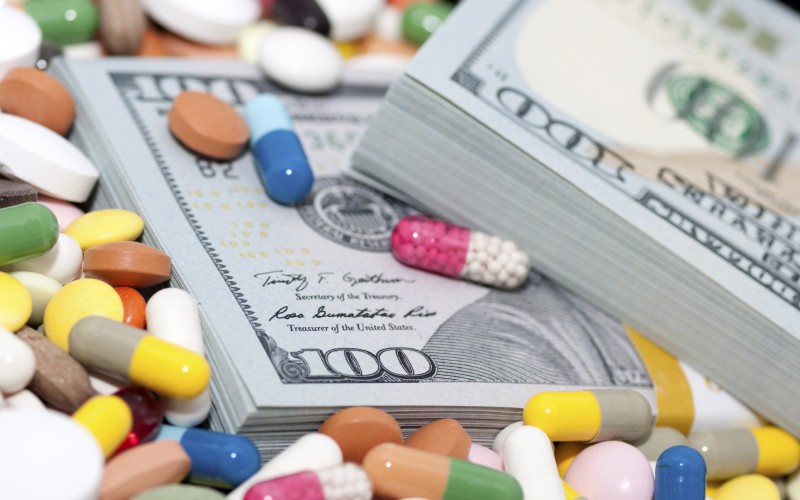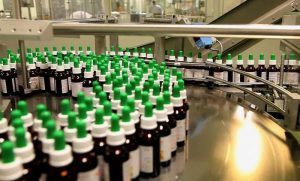Government official: Coronavirus vaccine trial starts Monday
________
Source: Personal Liberty
December 15, 2017 | by Jon Rappoport
This first appeared at Jon Rappoport's blog, NoMoreFakeNews.com, on December 15, 2017.
Over the last 11 months, pharmaceutical companies have spent a stunning $3.2 billion on TV ads for drugs.
That much money buys you influence. It buys you control.
If a major network suddenly decided to set its hounds loose and investigate the overall devastating effects of medical drugs on the public, there would be hell to pay at the network. Drug companies wouldn't stand for it.
Robert F Kennedy, Jr., whose film, Trace Amounts, about toxic mercury in vaccines, was getting no media coverage, made this comment:
I talked to Roger Ailes [then CEO of FOX News], who I have known since I was 17 years old, he's very sympathetic with this issue and saw the film Trace Amounts. I said to him, "I just want to go on one of your shows. Nobody will allow me to talk about this or debate me." He said to me, "I can't allow you on any of them. I'd have to fire any of my hosts that allowed you on my station." Because he said, "My news division gets up to 70 percent of advertising revenues during non-election years from the pharmaceutical companies."That's called control.
There is a wider sphere to consider. Through octopus foundations like Rockefeller and Gates, for example, the medical/pharma agenda is part and parcel of the Globalist agenda. That is key. Gathering in the world population under the umbrella of "humanitarian health care" is a covert op of the highest order.
How can you control billions of people, erase national borders, destroy untold numbers of communities and their traditions, wage senseless wars, send millions of jobs out of industrial countries to Third World backwaters, and build a de facto global management system — unless you can also debilitate, weaken, confuse, toxify, and thus pacify those billions of people?
Accomplishing this is the work of the pharmaceutical empire.
I have produced, many times, open-source mainstream reviews of the death and damage numbers wrought by "Rockefeller medicine." In the U.S., 106,000 deaths every year from government-approved medicines. In the U.S. and Europe, 330,000 die, every year, from correctly prescribed drugs. 6.6 million hospitalizations occur. 80 million adverse effects occur. These are conservative estimates.
So… what is the likelihood that pharma-controlled mainstream news will dig deeply into the issue of Globalism, the major tyrannical movement of our time?
The likelihood is zero.
The influence of pharmaceutical interests on the news is, therefore, much greater than most people can fathom, in their wildest dreams.
Most people, when confronted with these pharmaceutical death-and-destruction reports, will immediately dismiss them as impossible. Others, who accept the reports, will claim the "unfortunate" facts show no intention to harm whatsoever.
However, the reports are public knowledge. They've been available to one and all. Government officials — and particularly, pharma princes — know the truth. And they're doing nothing about it.
This is called a clue.
If you were in charge of a juggernaut operation that was causing this much horrific damage, and you knew it, would you stand by and let it keep happening? Would you foster the development of new drugs whose effects would only add to the ongoing tragedy? And would you exert such powerful control over major media that the truth could not be told?
I didn't think so.
The pharma princes are not like you. You can't see who they are if you look through the lens of your morality. They don't share that morality. They don't resemble you. Don't ascribe your qualities to them. They don't respond to life as you do. Their capacity for self-deception is awesome. Your good is not their good.
It is as if they were born freezing and never recovered. They come from an Ice Age and their blood is still cold.
They are rigid robots. Muscular truth can take them down.
Please go to Personal Liberty to read the entire article.
________
Source: Pro-Market
"The Pharmaceutical Industry Has a Large Amount of Control Over the Field of Oncology"
July 24, 2017 | by Guy Rolnik
In the second part of our two-part interview with Daniel Goldstein, MD, an oncologist who studies the influence of business interests on healthcare, we talk about the capture of the health system by pharmaceutical companies.
Drug manufacturing line. Photo by Julphar.uae (Own work) [CC BY-SA 4.0], via Wikimedia Commons
In the previous installment of our two-part interview with Daniel Goldstein, we talked about capitalism and healthcare, what motivates physicians, and the effectiveness of the healthcare systems in the U.S., U.K., and Israel. In this part, we focus on capture: the influence that pharmaceutical companies and other health suppliers have over all aspects of the health system.
Guy Rolnik: Let's go back to your notion that the pharmaceutical industry influences how medicine is being researched and provided. Would you say doctors and physicians are influenced by interest groups and drug companies and trade groups? And if yes, how?
Daniel Goldstein: For sure, it's happening. If I take my field of oncology specifically, the pharmaceutical industry has a large amount of control. I wouldn't say controls completely, but has a large influence over academic work, medical care, prescribing habits of physicians, and so on.
How does this happen? There's an interplay in many, many different ways. Drug trials were once run by independent, government-funded cooperative groups that were independent of pharmaceutical funding. Most of that funding is disappearing, or [there are] very small amounts of funding.
GR: Because?
DG: Because the U.S. government is not committing large enough amounts of money.
GR: What you're saying is that, in the past, a large chunk of the funding for these independent trials came from the government.
DG: Yes.
GR: And now the governments' share is much smaller. Who makes up all the difference?
DG: Most new trials are what we call industry-sponsored trials, where the pharmaceutical industry develops the design of the trial and provides the funding.
GR: So, you are saying here that it's not only the funding but also the actual design of the trials.
DG: Yes, they design the trials. Some of these trials may be skewed to the business interests of the company.
GR: Can you know they are skewed even before they start?
DG: Yes.
GR: What happens if you object to that? You're a physician, you object to the design and say, "This and this is skewed."
DG: That's a good question. Many of the academic researchers, the big academic centers, receive much of their funding from the pharmaceutical companies to run their clinical trials. If they start putting up objections, saying for example, "No, we should use this dose and not that dose," they might run the risk of being defunded or not having that trial opened at their center.
GR: The drug companies provide the funding and they design the trials. What entities actually perform the trials? Is it public entities, academic entities, or business entities?
DG: The trials are run out of academic hospitals. Basically, what we call a clinical trialist—who's an academic physician—sees patients, recruits them, and puts them on the trial. It's basically different hospitals. The trials are run through different hospitals. The hospitals get funding through that mechanism.
GR: So, it’s not just a question of funding by private entities but also the design of the trials.
DG: Yes. It's problematic because they design the trial.
GR: Have you witnessed some of these trials?
DG: Yes. I put patients on clinical trials that we have running.
GR: And you're aware of the design of the trial.
DG: Right. But the trial is given to us.
GR: But you were obviously aware of the design.
DG: Right.
GR: How many such trials have you taken part in?
DG: I'm young in my career. So far, I've recruited patients on maybe four or five trials.
GR: In Israel, right?
DG: Yes, but it's the same in other places. You might have the same trial running in America.
GR: So, you personally took part in four or five trials. Did you have any cases where you thought that the design provided by the drug company was skewed, biased, or had no, or little, scientific value?
DG: Yes. There are trials where, scientifically speaking, they are not going to definitively answer the question the trial sets out to answer, or trials that are designed with a dose of a drug that's too high and not as necessary. But don't forget, this could also happen in a non-industry funded trial—perhaps it's just part of the scientific process. But when there is also a business interest, it raises concerns that some of the decisions made in the trial design are business decisions and not scientific or medical decisions.
This relates to something we published a few weeks ago. It was when we released data as the company changed the dose of the drug from 2mg/kg to 200mg for all patients. They used that dose in a trial and that led to the FDA approval. By changing the dose, the company actually may have been increasing revenue by a billion dollars annually—just by giving slightly more drug to each patient.
GR: Would it be correct to say that it is not uncommon to find a drug company-funded clinical trial that is skewed?
DG: That's correct.
GR: Would it also be correct to say that it is skewed in a direction that would benefit the drug company?
DG: That's also correct. Sometimes, one may argue it's not intentional, but it may be intentional also.
GR: We talked about trials. Have you seen cases where drug companies influence academic basic science, and even not basic science? Do they have an influence over the projects that are chosen and those that are rejected?
DG: Let's talk about journals and conferences, because those are two major arenas of academic prestige.
Let's first talk about journals. What's interesting about journals is that the big academic journals, such as the New England Journal of Medicine (NEJM), or in my field, Lancet Oncology, often publish big trials run by the pharmaceutical industry that show a survival benefit of two months for patients. No cure, just increasing survival by two months. To me, many of these have minor clinical relevance to the majority of patients. It's an improvement. Two months is not nothing but it's not a massive survival benefit. The question you have to ask is, why are these journals— the most prestigious journals—publishing these trials, trials that show such a minimal clinical benefit? The answer may lie in the question of what's called reprints.
If, say, I publish my own unfunded paper in a journal, I may get an email asking me to purchase "reprints"—glossy individual pamphlets of the paper. There is a lot of money in it: the original publisher is paid for reprints and pharmaceutical companies do purchase these reprints, perhaps in large numbers. It's an undisclosed and undiscussed problem. It's not clear how much journals are receiving in reprints from the pharmaceutical companies. It seems that that's the mechanism, meaning that most of these industry-funded trials, which clinically offer no major breakthroughs, are being published in these prestigious journals. Sometimes they're "me-too" drugs. Why? Because they’re getting money from reprints.
GR: Does it go as far as papers on drugs that offer only minor benefits are chosen over papers about trials on drugs that are probably more beneficial?
DG: I'm not saying drugs that have more benefit health-wise are rejected. Not necessarily. I just often wonder how journals make such editorial decisions. Are the decisions completely free from business interests? Maybe not? But it's important for the company to publish in a prestigious journal, as it increases credibility for the treatment and may lead to increased sales.
Please go to Pro-Market to read the entire interview.
________
Related:
Big Pharma Gives Big Money to the Senators Who Will Question Drug Company CEOs Today
Think these businessmen and lawyers in the US senate and congress - they claim to be representing you - care about the coronavirus statistics which are not threatening when compared to the yearly $1.6 billion just on the flu vaccine market alone with an upside potential of $4 billion? Why? Because the coronavirus is being piggy backed to this financial collapse to usher in a new global financial system.
World Meters - Coronavirus Update
"We pledge our honor and sacred corporate laws to more big pharma payouts."
Continued reading:
FDA medical adviser: 'Congress is owned by pharma'
Is Bill Gates Profiting From The Outbreak? Or Is Something Far More Sinister Taking Place?




No comments:
Post a Comment
Note: Only a member of this blog may post a comment.